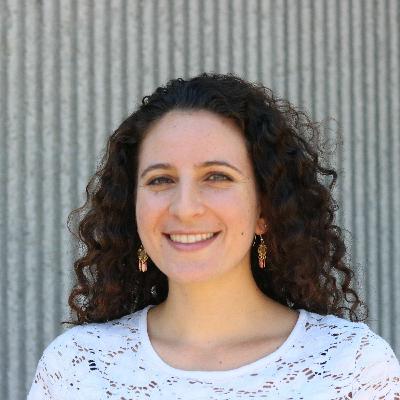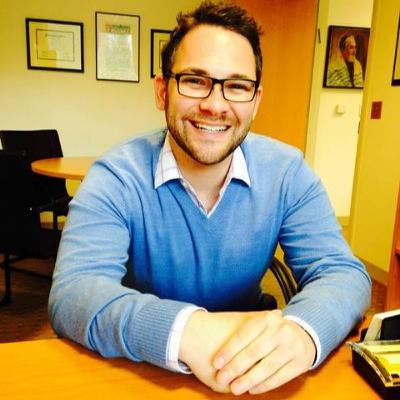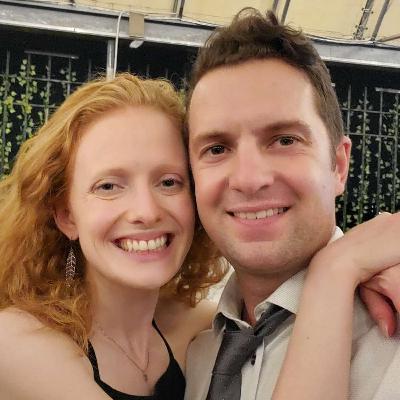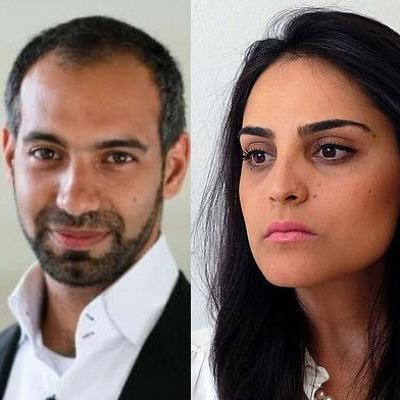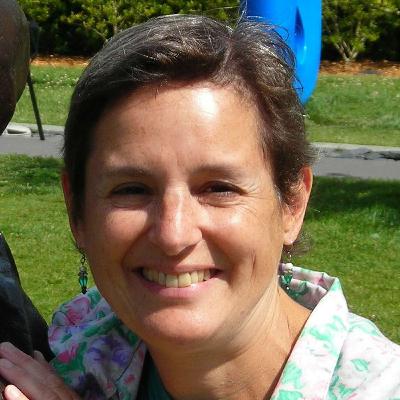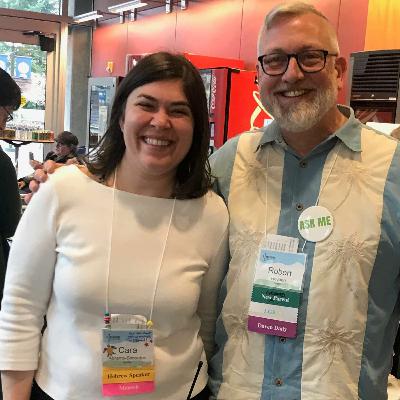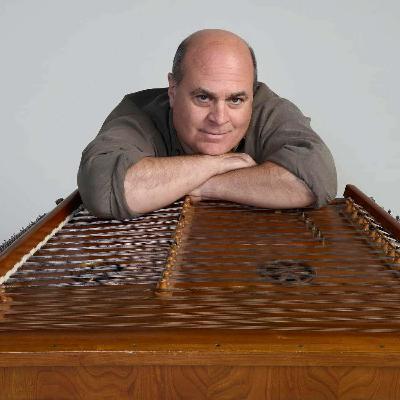Discover The Seattle Limmudcast
The Seattle Limmudcast

The Seattle Limmudcast
Author: The Seattle Limmudcast
Subscribed: 0Played: 12Subscribe
Share
© All rights reserved
Description
Limmud Seattle is a festival of Jewish culture, creativity, and learning where people of all levels of knowledge and participation can learn and share ideas. The podcast features intimate interviews with its presenters.
22 Episodes
Reverse
Avi Rosenfeld tells us about his Jewish journey beginning with a childhood in a family of “Western wandering Jews” raised secularly, to becoming an Orthodox rabbi and hospice chaplain. He grew up in several places in the Western United States inspired in his Jewish identity by his grandparents, but at the same time not being part of a synagogue community. He became more interested in Judaism after taking a class in conceptual physics in community college, reading “The Dancing Wu Li Masters”, and getting the impression that Judaism might give him more insight into the connection between physics and spirituality. With a newfound wanderlust after a trip to Mexico and Guatemala, but still holding a “religion is the opiate of the masses” attitude, Avi traveled to Israel to learn about his family history and Jewish identity. Once in Israel he was hooked by prayer, learning, and community. After a brief stint at home, he returned to Israel to learn at Yeshivat Bat Ayin, married, and welcomed his first child. Back in the US, Avi finished his BA and decided to pursue ordination at Yeshivat Chovevei Torah, and found his calling in chaplaincy. He also speaks about how being a chaplain has deeply informed his leadership of Mercaz Seattle (a modern orthodox congregation), and his finding joy in Judaism is a message he hopes to bring to his congregation. The interview closes with a niggun that goes back to the Breslev Chasidim: “B’Motzei Yom Menucha”, and a shout out to the Niggun Collective which is a niggun singing group started in the pub of Limmud Seattle 2019. Interview by Daniel Zana.
Alicia Jo Rabins talks about her curriculum "Girls in Trouble", which centers around stories of female characters from the bible, as well as songs that she has written about them. Alicia Jo talks about the choice of the word “Trouble” and how as a girl growing up in a predominantly Christian neighborhood she was unfamiliar with Jewish perspectives on biblical characters and text study. Only when she started to study the Torah in depth as an adult did she discover that the characters were complex people, and encountered all manner of challenging life circumstances. She tells us that she found midrash after studying James Joyce’s “Ulysses” and found parallels in the way epic stories were reinterpreted to connect to everyday life. She talks about how classic midrash was in the form of text, but modern midrash is done in other art forms as well, including dance and music. Alicia Jo then discusses in depth her song “Snow/Scorpions and Spiders” including the original text that she drew from, drawing parallels to Moses’ experience on mount Sinai, and her own experience camping in the desert in Israel and at meditation retreats. We end on a discussion about the curriculum and the midrashim students have created. Listeners are invited to check out some examples at https://www.girlsintroublemusic.com/gallery/, and you can find more about the curriculum at https://www.girlsintroublemusic.com where the units are all available for purchase and download. Alicia Jo has a new film “A Kaddish for Bernie Madoff” is currently in submission to film festivals for 2021, with a planned release of 2022! Interview by Tamar Libicki
Limmud Seattle 2019 presenter Jessica Ost introduces the program she runs at the Stroum JCC: Giving Initiative For Teens (GIFT). It is a Jewish teen philanthropy project where the teens act as a micro-foundation and focus on specific funding priorities. The teens make a call for proposals, hear from non-profits addressing their chosen issue, go on site visits, and eventually award grants based off of their Jewish values. This year, the Jewish values that the teens focus on include: sustainability, pursuing peace, freedom, dignity, justice, humility, and respect. Jessica brings Jewish texts to the monthly meetings and has posted Jewish values on the walls of each meeting so that the teens can consider their work in the context of the Jewish values. Jessica talks about how the teen’s Jewish identity is solidified through incorporating charitable giving as a touch point for their connection to Judaism. By engaging in the fields that they pick and learning deeply about them the teens are exposed to new experiences and empathy, as well as sense of bonding with the other teens in their cohort. Applications for the 2020-2021 calendar year GIFT program will be available in April and close in June on the SJCC.org website. Interview by Tamar Libicki.
Anat Ben Shaul discusses how the passing of her aunt Mazal inspired her to begin on a novel about the Yemeni Jewish community and their immigration to Israel. To write the novel she had to research the history of her community. She obtained historical resources from the JDC, read through hundreds of documents, and was brought to tears reading about the hardship of her ancestors. She goes on to tell us some family stories about her Aunts Mazal and Rania and how the stories that sounded fantastical to her as a child began to make sense as she learned the historical context of her parents' and grandparents’ childhoods. She ends the interview by giving a short overview of the Yemeni Jewish community focusing on the time of their immigration to Israel. Check out the YouTube video of her Limmud 2020 session here: https://www.youtube.com/watch?v=wnnZUv_OqpU&t=818s. And check out the blog she wrote about her Aunt Rania’s story here: http://aforlifestyle.blogspot.com/2015/04/aunt-rania-almost-queen-of-yemen.html. Interview by Tamar Libicki.
Marianne Tatom talks about her origin story in Yiddish, when she met her partner’s aunt who did not speak English, which led her to study and later teach Yiddish. She discusses her training at the Yiddish Book Center as a “Yiddish Pedagogy Fellow” and its new textbook “In Eynem.” She goes on to describe the philosophy of the teaching method she learned there as celebrating Yiddish as a vibrant living language that is learned by practice rather than memorizing grammatical rules. Marianne discusses the growing interest in Yiddish in Seattle by talking about the variety of classes offered around town, Yiddish events throughout the year, and a flourishing Klezmer scene. She says there are many reasons to be enthusiastic about learning Yiddish from exploring family history to the joy of singing together in Yiddish. Interview by Tamar Libicki
Marianne recently wrote an article called "Seven things people say about Yiddish that drive me crazy" that was translated into Yiddish for the Forverts (Forward). You can read it here: https://forward.com/yiddish/438604/nine-things-people-say-about-yiddish-that-drive-me-crazy/
Esther Kustanowitz discusses her love of Star Wars and how she finds similarities between Star Wars and Judaism. Growing up “Conservadox” and going to Jewish day school gave Esther an appreciation of Jewish tradition and text study, while at the same time allowing her to develop a deep love of pop-culture. She uses this perspective to conceive of Star Wars within a Jewish frame. An example she discusses is the story of Chanukah, and how a scrappy group of rebels fights an evil empire with “light” winning the day. She considers the Jewish idea of “kehillah” or community as found in both the Star Wars stories and in the groups that form through Star Wars fandom. She also talks about how her desire to explore stories of lesser known characters in the Star Wars galaxy finds a parallel in midrash. Interview by Tamar Libicki
You can check out Esther's writings and podcast “the Bagel Report” for the Jewish Journal at www.jewishjournal.com as well as her writings for J. the Jewish News of Northern California at www.jweekly.com. Follow her on twitter @EstherK
Limmud Seattle 2020 presenter Natan Meir discusses how marginalized Jews were viewed and treated in Jewish communities in Eastern Europe in the modern period. Natan starts off by talking about how modernity is defined and how Jewish history classes in college sparked his fascination with the Jews of Eastern Europe. He later describes how East European Jewish culture was the precursor to many aspects of modern Jewry. While figuring out who the marginalized of Eastern European Jewry were, he found two cultural institutions that helped him define his subjects: the hekdesh (poorhouse), and the cholera wedding. He also discusses literary sources from this time period that portrayed the marginal person as the protagonist, which he saw as part of a larger trend of using those on the edges of society as "outcast" symbols for the Jewish people. He ends by reporting that he has discovered many modern organizations whose mission it is to bring those with disabilities into the heart of Jewish community and hopes to share his findings with those groups. Interview by Tamar Libicki.
David Singer discusses how his Jewish journey brought him to the role of National Director of Limmud North America (Limmud NA), and how his passion for building Jewish community inspires him to grow Limmud NA into a movement. From his childhood experience of acting in plays about biblical events with his synagogue, to becoming a Hillel director, he has thought a lot about what motivates people to embrace their Jewish identity and live Jewishly. He talks about learning with others as an antidote to loneliness, curiosity being the bed-rock of the Limmud movement, and how the capacity to share a joint fate has been the Jewish people’s strength throughout history. He goes on to say that his hope for the Jewish people is the cultivation of imagination for the future. Interview by Tamar Libicki
Limmud Seattle 2018 and 2019 presenter Al Maimon discusses the siddur: Avodat Hashana, Kehilat Yaackov, published in Belgrade in 1904. By studying the prayers and texts, as well as the essays included, the siddur sheds light on the culture and attitudes of the time. The inclusion of a prayer to be said in the middle of the night reveals an often forgotten practice of Tikkun Chatzot. The inclusion of the apocrypha Megilat Antiochus and Ma’ase Yehudit are accompanied by an essay by the author Yaackov Moshe Chai Altaratz about the presence of Jewish heroes and heroines throughout history. The Jewish history of the Belgrade community, specifically communal taxation and chevrot, as well as Altaratz’s background are also discussed. Interview by Tamar Libicki
Limmud Seattle 2019 presenters Kayla Higgins and David Warnock discuss how their decision to lead a session on their respective professions (law and policing) inspired them to delve deeper into the Jewish traditions around both. They found many differences between the modern secular court system and descriptions of Jewish courts in biblical and Talmudic times, including: the allowance of confessions to be used as evidence, high standards for judicial selection, and the perception of attorneys within the justice system. Interestingly, references to law enforcement officers are few and far between, but are alluded to by the biblical injunction on individuals to stop crimes. Through the lens of the “Prayer for the Government” they discuss the difference in law enforcement as a group that is subjugated by a government and one that participates in all levels of government. Interview by Tamar Libicki.
Limmud Seattle 2018 presenter Pamela Brown Lavitt discusses how her journey to discovering her Jewish identity led her to learn Yiddish, collect stories as a folklorist in the Chasidic community, and ultimately serve as an oral historian for the Jewish Women’s Archive. She tells about the process of interviewing key older women in the Seattle Jewish community and thereby gaining a rich knowledge the unique Jewish history of the city, and some women’s experiences of it. She goes on to give advice on how to interview Jewish women in your life, and concludes by drawing connections between her work as an academic and oral historian and as director of SJCC Arts + Ideas and the Seattle Jewish Film Festival at the Stroum Jewish Community Center. Learn more at www.sjcc.org/arts-ideas. Interview by Tamar Libicki.
Limmud Seattle 2019 presenters Gilah Kletenik and Samuel Klein discuss Rembrandt, Menashe ben Israel, and Spinoza, three great minds who coexisted in old Amsterdam. While detailing what made each of them unique, they also discuss ways they overlapped in the vibrant intellectual community of the time. We learn about the groundbreaking way Rembrandt utilized the new technique of chiaroscuro along with his own innovation of layering paint, to create personal and emotional paintings. Menashe ben Israel is shown to be a great rhetorician who bridged communities, but was ultimately disappointed by his inability to get Jews allowed back into England. We see Spinoza in the context of his community, but also how his groundbreaking thought transformed fields as varied as psychology, religion, and politics. Interview by Tamar Libicki.
Limmud Seattle 2019 presenter Tony Ramsey discusses voluntary simplicity, and how realizing what brings you joy in life can allow you to get rid of things and situations that are weighing you down. He points out that by valuing your time, it frees you up to pursue passions instead of materialistic goals that are ultimately unsatisfying. He talks about his own life journey, and how a change in perspective allowed him to become more involved in Limmud Seattle, build a vibrant community, switch jobs, and ultimately plan a meaningful wedding. Through involvement with Limmud he crafted a session emphasizing the long Jewish tradition of voluntary simplicity. Interview by Tamar Libicki.
Limmud Seattle 2019 presenter Rochelle Wynne discusses the ethical will, a letter written to your children and grandchildren to be read after your death about the values you hold dear. She discusses growing up in a household where talk of death was taboo, and how, in her thirties, her congregational rabbi inspired her to spread the word about ethical wills and Jewish ritual surrounding death. She encourages others to overcome their ethical-will-stumbling-blocks, and to pass on their beliefs and passions to the next generation. Interview by Tamar Libicki.
Limmud Seattle 2019 presenter Paula Rose urges us to think about what we want the guests at our Seder, and specifically the children, to come away with. She suggests adding points of surprise, curiosity, and engagement. Examples include adding a new tradition, a change in location, or saying “Ma Nishtana” in a new language. To illustrate this concept she discusses two Talmudic passages where the rabbis give tips on how to get the children to ask questions and stay awake. Interview by Tamar Libicki.
Limmud Seattle 2019 presenter Shimon Emlen talks all about matzah. From the basics, including the difference between hand-made shmura matzah and store bought box matzahs, to how the matzahs are made, and the spiritual significance of matzah. He also goes into detail about how he runs a model matzah bakery to inspire a love of matzah in children and adults. Interview by Tamar Libicki.
Limmud Seattle 2019 presenter Linda-Jo Greenberg talks about how her lifelong love of Passover on the one hand, and lists on the other, led her to create a booklet, and teach a Limmud session, about how to make Passover prep “easier.” Her tips include: making a calendar of tasks, taking extraneous tasks off the list if you get overwhelmed, and including favorite family recipes to build excitement. Interview by Tamar Libicki.
Limmud Seattle 2019 presenters and co-chairs Cara Abrams-Simonton and Robert Hovden talk about how they first encountered Limmud and eventually decided to co-chair a festival. While co-chairing had its challenges, Cara and Robert speak of the joy of connecting with volunteers and participants, as well as the pleasure of introducing community members to one another. Robert explains how intentional succession planning makes each year new. Interview by Tamar Libicki.
Limmud Seattle 2018 presenter Joshua Horowitz talks about how a resurgence of antisemitism that he observed while studying music in Austria in the 1980s led him to research and start playing historical Jewish music. He speaks about how his quest led him to searching out village musicians in Eastern Europe, combing archives and listening to old recordings, and finding historical musical instruments. He also discusses projects with his bands Varetski Pass and Budowitz. Interview by Carl Shutoff
Limmud Seattle 2018 presenter Miriam Libicki talks about her process for creating autobiographical and non-fiction comics. She discusses how her comics have led to meaningful connections and served as a therapeutic outlet. She also talks about her use of childlike faces to make hard subjects more accessible and using an avatar to embody her personal perspective. Interview by Tamar Libicki conducted on 12/13/18.




